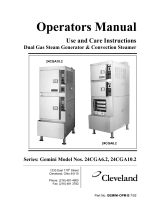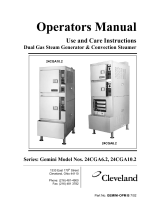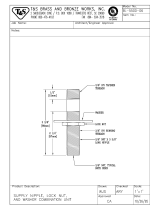
Installation, Use and Care Instructions
Convection Pro XVI
CARE AND CLEANING
The Cleveland Convection Pro XVI steamer must be cleaned
regularly to maintain its fast, efficient cooking performance,
and to ensure its continued safe, reliable operation.
1- The boiler must be drained (blowdown) after a maximum of
8 hours of use. If the boiler feedwater contains more than 60
pans per million of total dissolved solids, the boiler must
have a blowdown more often, the frequency depending upon
the mineral content of the feedwater. Blowdown means the
boiler must be drained under pressure.
THE BOILER BLOWDOWN IS PERFORMED BY
SIMPLY SHUTTING OFF THE STEAMER'S RED-
LIGHTED POWER SWITCH WHILE THE BOILER IS AT
NORMAL 10 PSI OPERATING PRESSURE-WHEN THE
BOTTOM OF THE POWER ROCKER SWITCH IS
PRESSED, ITS RED LIGHT GOES OUT, AND THE
DRAIN VALVE AUTOMATICALLY OPENS,
DRAINING THE BOILER. AN AUTOMATICALLY-
TIMED DRAIN WATER CONDENSER WILL FLUSH
THE DRAIN FOR 3 MINUTES, THEN SHUT OFF.
AFTER 3 MINUTES THE STEAMER IS READY TO BE
RESTARTED.
When steam is produced, the water in the boiler is being
distilled. Daring this process, the minerals that come into the
boiler with the water, remain in the boiler as the water boils
away as steam. When allowed to accumulate, the water
becomes highly mineralized, which results in erratic
operation, lime build-up, corrosion, and premature electric
heater failures. In some cases, complete boiler replacement
becomes necessary, which is extremely expensive. By
draining the boiler under pressure, most sediment present will
be flushed down the drain.
2. The steamer is equipped with a drain in the back of the
cooking compartment. No compartment should be operated
without the drain screen in place. This screen prevents large
food panicles from entering and possibly plugging the drain
line. Any restriction of the drain line may cause a slight
build-up of back pressure in the compartment, resulting in
steam leaks around the door gasket. It also may adversely
affect the convection action of the steam in the
compartment, which is critical to optimum performance.
Pouring USDA approved drain cleaner through the
compartment drains once a week will help to ensure an open
drain- A manual (hand crank) drain auger, or "snake", may
be safely used to clear obstructions in the compartment
drains. Do not use a power auger, as damage to the plastic
drain system will result. With the steamer off, open the
cooking compartment doors and allow the steamer to cool
before cleaning the cooking compartments and their
components
3. At the end of each day's operation, wash the pan slides, steam
tubes, door gaskets, and compartment interiors with mild
detergent and warm water, either by hand or in a
dishwasher. Rinse thoroughly with clear water. Rinse water
should drain freely through the compartment drain
openings. If it does not, the dram must be cleaned before
using the steamer.
4. Once a week, remove the steam tubes and clean the orifices.
First, remove the pan slides by lifting upward and toward the
center of the compartment. Pressing backward on the steam
tube will allow its front eyelet to clear the compartment stud.
The tube is then angled toward the center of the compartment
just enough to clear the stud and be pulled forward, out of its
socket- The orifices can be cleaned easily with a paper clip.
Then, thoroughly wash and rinse all steam tubes- This can be
done in a dishwasher. Lubricate each rube's tapered end with
cooking oil before replacing in the steamers compartments.
Be sure all four steam tubes are securely in place before
activating the compartment. The tubes are interchangeable
and may be placed in any spot in either compartment.
5. To prolong door gasket life, always leave compartment door
ajar when not in use.
6. Exterior Care: Allow steamer to cool before washing. Use the
same cleaners and cleaning procedures as for other kitchen
surfaces of stainless steel and aluminum Mild soapy water,
with a clear water rinse, is recommended- Do not allow water
to run into electrical controls. Always turn off equipment
power before using water 10 wash equipment. Do not hose
down the steamer.
WARNING
Do not store or use gasoline or other flammable vapors and
liquids in the vicinity of this or any other appliance.
MAINTENANCE
Periodically, a qualified serviceman should be summoned for
routine preventive maintenance.
1. The blowdown procedure will not completely remove the
mineral deposits that adhere to the top of the boiler- A
chemical descaling should be done by a boiler treatment
specialist. This should be done once a year in average water
conditions, but in poor water areas it may be needed two or
three times a year.
2. Periodic boiler inspection should be made by a qualified
serviceman.
3- Once every three months, the cold water line strainer should
be cleaned.
Cleveland Range supports a comprehensive network of Main-
tenance and Repair Centers (regional pans and service dis-
tributors) throughout the United States and Canada. Please
contact your nearest distributor for the name of an authorized
service agency in your area, or for replacement pans and
information regarding the proper maintenance and repair of
Cleveland Range equipment. In order to maintain the various
agency safety certifications, only factory-supplied replacement
pans should be used. The use of other than factory-sup-plied
replacement pans will void the warranty.
Primed 6/90 Cleveland Range, Inc.























